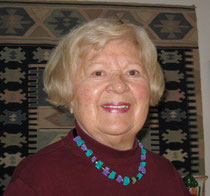Ingrid Stabins
The very essence of life is growth, which means change.

My first thought was to write this memoir for my children and grandchildren. I am the only one of my family who immigrated from Germany to this country. My children knew very little about my German homeland, especially the tragedies our family suffered after the end of WWII. We were expelled from our homeland, lost our father and home and had no place to go. All this changed my life forever. As a sixteen year old, I was interned in a camp in Poland with the expectations of being shipped to Russia for work.
My story describes the brutal experiences the people suffered as the Russian forces fought their way through our area to Berlin, my survival in the camps, searching for my family, and finally reuniting with them.
Not having much experience with writing, I joined the ALL writers group at the Community College. After many years of developing my writing, and after the encouragement of friends I published the memoir in 2012.
My email: ingsta28(at)gmail.com
Please CLICK HERE to view a video of me speaking at a Rising Tide Writers'
reading in April 2013.

"Give Me Tomorrow" is available at a number of locations:
- Paperback (printed) - Amazon.com
- E-book (Kindle Edition) - Amazon.com
- E-book (other format) - Smashwords.com
Excerpt from “Give Me Tomorrow”
Copyright © by Ingrid Stabins 2012
On the 27th of January 1945, the daughter of the railroad stationmaster came running through the deep snow behind the farm buildings and barns; her message made us gasp. Her father had been shot on the spot, and several soldiers were on the way into town. A Russian tank had appeared at the station and was hiding behind a large pile of straw across the street. It was a horrifying story. We knew something like this would happen.
These soldiers—they were only a few---walked brazenly down the sidewalk. Their faces were barely visible under the wooly caps they wore. Each carried multiple guns, one slung over their shoulders and one in their hands ready to shoot. We stood behind the curtain at the window and watched them go by. The soldiers already had information from the foreign workers who worked on the farms; they were quick to strike down certain people.
One was the Bürgermeister (mayor); he was shot point blank and left in his farmyard. Another person was the owner of a large estate. Then the soldiers disappeared as quickly as they came. Perhaps at this time we might have had a chance to leave. A troop of German soldiers came though the next day. We might have been able to follow them, but they pacified us and told us not to worry; they would fight the Russians. They were in a hurry and didn't want to bother with civilians. So we waited and agonized.
Two days later, the main Russian force arrived. We heard the rumble of heavy vehicles coming closer. What we saw was overwhelming. Soldiers were huddled on tanks in their quilted uniforms with all kinds of guns pointing. For three days and nights, the Russian troops on tanks and trucks drove slowly through our little village. Enormous guns labored on the cobblestone street; the house was trembling. We wondered when this would come to an end. How could our depleted military force, including those young boys on horseback who we saw just a few days ago, hold back this Russian onslaught?
The first night, father made us all go into the potato cellar, which was under one side of the barn and offered a good place to hide. The door was almost hidden. He thought they might not look there right away if they should stop and storm into the houses. We took blankets and crouched on top of the potatoes and stayed there all night, listening and waiting.......
 Rising Tide
Writers
Rising Tide
Writers
